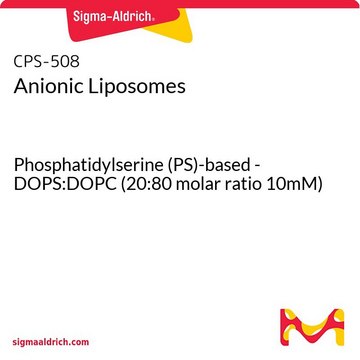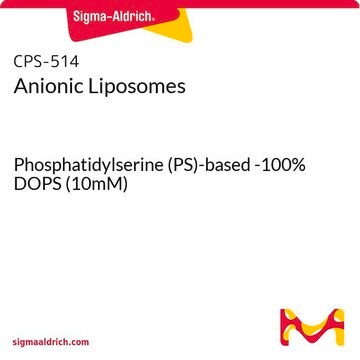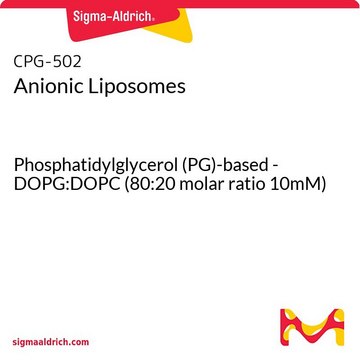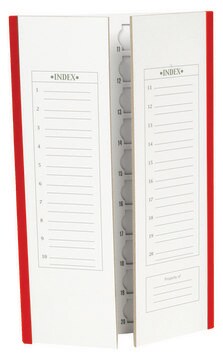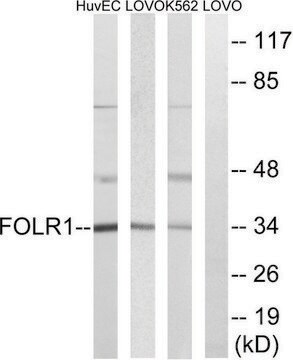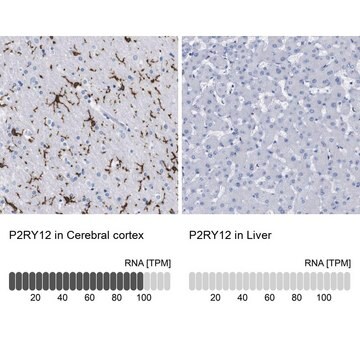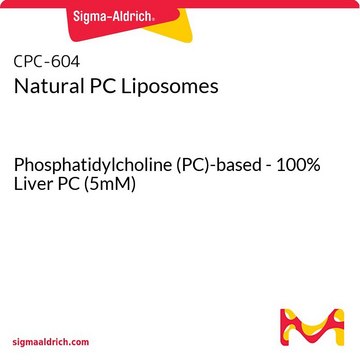CPG-508
Anionic Liposomes
Phosphatidylglycerol (PG)-based - DOPG:DOPC (20:80 molar ratio 10mM)
Autenticatiper visualizzare i prezzi riservati alla tua organizzazione & contrattuali
About This Item
Codice UNSPSC:
12352211
NACRES:
NA.25
Prodotti consigliati
Livello qualitativo
Composizione
Phosphate buffered saline
Concentrazione
10 mM
Impurezze
20 mol % DOPG
80 mol % DOPC
Dimensione particelle
100 nm
pH
7.4
Cerchi prodotti simili? Visita Guida al confronto tra prodotti
Descrizione generale
Liposomes are extensively used to study the interaction of proteins, peptides and other molecules with the surface of a lipid membrane. One of the parameters that affects this interaction is the charge of the liposomal membrane. Phosphatidylglycerol (PG) is a negatviely charged molecule. The amount of the negative zeta potential in the liposomes depends on the molar percentage of PG in the formulation. The anionic-phosphatidylglycerol (PG) liposome catalog contains products made from 0.5 up to 100 percent DOPG with various amount of negative zeta potentials. The matrix lipid DOPC used in the formulation does not significantly contribute to the charge of the liposomes.
Applicazioni
Drug delivery
Lipid-protein interactions
Lipid-protein interactions
Stoccaggio e stabilità
Liposomes should never be frozen. Liposomes should be stored in the dark at 4°C, except when brought to room temperature for brief periods prior to use.
Liposomes are made under sterile conditions. If you need to take multiple aliquots out of the vial, it is advised to take extreme care in not contaminating the vial. It is recommended to handle the vial under a sterile hood to maintain the sterility of the product. Liposomes should never be frozen. Ice crystals that form during freezing will rupture the lipid membrane of the liposomes and change the size of liposomes particles.
Liposomes are made under sterile conditions. If you need to take multiple aliquots out of the vial, it is advised to take extreme care in not contaminating the vial. It is recommended to handle the vial under a sterile hood to maintain the sterility of the product. Liposomes should never be frozen. Ice crystals that form during freezing will rupture the lipid membrane of the liposomes and change the size of liposomes particles.
Note legali
Cellsome is a trademark of Encapsula NanoSciences
Product of Encapsula Nanosciences
Esclusione di responsabilità
For research use only
Codice della classe di stoccaggio
12 - Non Combustible Liquids
Classe di pericolosità dell'acqua (WGK)
WGK 2
Punto d’infiammabilità (°F)
Not applicable
Punto d’infiammabilità (°C)
Not applicable
Scegli una delle versioni più recenti:
Certificati d'analisi (COA)
Lot/Batch Number
Ci dispiace, ma al momento non ci sono COA disponibili online per questo prodotto.
Se ti serve aiuto, non esitare a contattarci Servizio Clienti
Possiedi già questo prodotto?
I documenti relativi ai prodotti acquistati recentemente sono disponibili nell’Archivio dei documenti.
Il team dei nostri ricercatori vanta grande esperienza in tutte le aree della ricerca quali Life Science, scienza dei materiali, sintesi chimica, cromatografia, discipline analitiche, ecc..
Contatta l'Assistenza Tecnica.